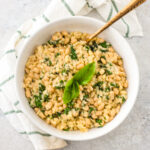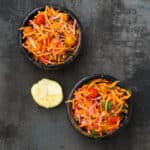The holiday season is around the corner. At this time of the year, as we get ready to cook a feast and celebrate with friends and family, another worry starts to creep in: how to avoid the uninteneded and unwanted weight gain. Read on to find out the facts about holiday weight gain and 8 tips to prevent side-tracking your health goals during the holidays.

Holiday eating can be stressful if you are worried about side-tracking your health goals, weight-loss goals, or simply sabotaging your healthy diet. But you can totally enjoy holidays without worrying about weight gain. This is not the time to stress out, but to enjoy and create memories. Here is a look at how to minimize stress around your health and prevent holiday weight gain if any.
Holiday weight gain: fact or fiction
1. Holiday weight gain may be overhyped
It is uncontested that holiday is the time when the avalance of food shows up on the table and overeating could easily happen while enjoying favorite holiday foods in the comapny of loved ones. One could easily blame this overabundance of food, specially mouth-watering desserts, for weight gain. However, contrary to the popular belief, for most people the weight gain is not significant. A number of studies exploring the holiday weight gain found the average weight gain to be only around 1 lb (0.5 kg) [1] [2]. But remember, the data from scientific studies is not the truth written in stone. It may work for the average, but maybe not for you. It's best to be your own health detective and gauge how much weigth do you actually gain during the holidays.
2. Holiday weight gain is higher among overweight/obese
While the average holiday weight gain is not significant, a study found the weight gain to be above-average among overweight/obese participants [3]. While this finding does not spell doom and gloom for those trying to lose weight (and may not be true for everyone), it is worthwhile following some caution during the holidays to avoid packing extra pounds, which may prolong the original weight-loss goal and even make it harder.
Actionable tip: whether you are overweight or not, weigh yourself before and after the holidays to see how much weight you have gained.
Navigate holidays without sabotaging your health goals
Holiday weight gain is not found to be extraordinary in scientific studies; however, this extra weight can easly linger and over the years may be responsible for extra pounds on your body. Here are some actionable tips to avoid packing pounds during the holidays.
1. Be more active
Although a number of factors contribute toward a healthy body, being active is one of the important ones. It doesn't help that the holiday passage of the year is normally cold, dark, wet, and windy, and is therefore not conducive to outdoor activities. Whereas in the summer you’d be walking in the park, cycling through the countryside, or hiking a mountain trail, in the winter you’re probably curled up on your couch trying to keep warm. Moreover, in the busyness of food and gift shopping, cooking, and attending holiday dinners/parties, your routine exercise schedule may take a back seat.
However, by sticking to or even upping your exercise quotient may not only help you burn extra food intake, it would offer extra energy boost to tackle extra holiday load, by de-stressing you.
Actionable tip: keep your exercise clothes and shoes in plain sight and hit the gym, use exercise equipment at home, go out for a walk (if the weather allows), do a video workout, or just walk in your house. Move, don't sit for long periods of time.
2. Follow a healthy lifestyle for 46 weeks
Some wise man has said that our habits determine the positive outcomes in our lives.
We are what we repeatedly do; excellence, then, is not an act but a habit.
Source: The Story of Philosophy by Will Durant
The holiday season lasts for six weeks, but actually has two celebration-heavy weeks: Thanksgiving and Chirstmas. Throw-in the new year party as well to count for the third week. What about the rest of the year? You are unlikely to gain significant weight just by eating a Thanksgiving or Christmas meal. It's the kind of meals you eat and the lifestyle (exercise, sleep, stress) you follow everyday throughout the remainder of the 46 weeks (in a year) that largely determine your weight and health.
Actionable tip: Do a check-in with your lifestyle that you follow most of the days, weeks, and months in a year that do not offer the refuge of holidays. If it comes short of maintaining your health goals and expectations, device a plan to live healthy most of the year.
3.0 Mindful, not mindless, snacking
We are the products of our environment and food is not an exemption. If you have a vagarant cookie right in front of you and you are hungry, most likely that's going to be your snack or even next meal. Food is everywhere and easily available, especially during the holidays. This can easily lead to snacking more frequently than you normally would.
Hide those sugary snacks and keep healthy and satiating snacks in your sight--on countertops, tables, and your office table drawers--whereever you look for snacks. Healthy snacks such as nuts, fruits, energy balls and bars, roasted chickpeas, hummus and veggies, and no-butter popcorn can offer energy and keep you full compared to sugary and salty snacks like cookies or chips. Scientific observations (studies) suggest eating high-protein snacks keeps the hunger at bay.
Want to avoid binge eating at the holiday dinner, eat a protein- or complex carbohydrate-rich snack before heading to the dinner table.
Actionable Tip: Hide unhealthy snacks out of sight and keep healthy protein- or complex carbohydrate-rich snacks like trail mix, fruits, energy balls and bars, roasted chickpeas, hummus and veggies, and no-butter popcorn in your plain sight. Consider eating a healthy snack before heading to the holiday dinner to prevent binge eating.
4.0 Watch those portion sizes
It's not only what we eat, but how much we eat affects our health and weight. Overeating is one of the reasons we gain and keep excess weight. The excess food on the (holiday party) table can easily lead to overeating, a pattern that can last throughout the holiday season of six weeks.
The holidays are most certainly a time to enjoy yourself and let your hair down, and if you seriously are craving a slice of pumpkin pie, a festive cookie, or any other sweet treat, don’t deny yourself this luxury, just watch those portion sizes. A petite slice of your favorite cake or pie will taste exactly the same as 3-4 big slices. To enjoy the taste and texture of your favorite foods, you don't need to get stuffed with it.
Watching your weight and eating healthily isn’t about depriving yourself, it’s about finding a healthy balance and enjoying things in moderation. If you deprive yourself, not only will you make yourself miserable, you’ll also be more likely to fall off the wagon and binge eat. Following a 80-20 rule or some version of it can help stave off binge eating sugar and junk food at the party table.
The 80-20 concept: Eat Healthy without feeling Deprived
Actionable tip: be aware of the portion sizes on your plate. Enjoy everything, but avoid stuffing yourself to the point of feeling sleepy.
5. Keep your meals balanced
It's always not possible to find healthy choices on a holiday dinner table. However, you can often find salads, soups, and roasted veggies. Load up your plate with what looks healthy at the table and then taste in small amounts everything that you find not so healthy. Again, healthy, complex carbohydrates like beans, lentils, and veggies along with protein can be your friend.
Actionable tip: often holiday eating is synonymous with desserts. So be aware if desserts fill up the majority of your plate. Fill up your plate 60-80% with non-dessert, real foods.
6. Watch out for "liquid" meals
Holiday meals are accompained by beverages; often a lot of beverages, both alcoholic and non-alcoholic. Beverages other than plain water pack a lot of calories, often are heavy in sugar. If you are going to enjoy beverages, cut down the food amount on your plate. Or swap a glass of sugary beverage with a piece of dessert. Remember, no-calorie beverages sweetened with non-nutritive artificial sweeteners are just as bad as the sugary beverages when it comes to your health.
Actionable tip: count how many beverages (other than water) are you having with your meals? Can you swap a serving of sugary beverage with a serving of dessert and vice versa.
7. Share leftovers with friends
Depending upon what your guests have brought to the dinner table, you can end up with too much food, resulting in leftovers that you could get stuck with eating for days after the actual celebration. Guests often tend to choose desserts and beverages, i.e., wine, so as not to interfere with the host's menu. This can result in a lot of desserts as leftovers. If you have those desserts in your refrigerator or on the countertops, sooner or later you are going to end up eating just to finish them off.
Actionable tip: if there are a lot of leftovers, especially desserts, keep some ziplock bags or disposable containers at hand to share food with family and friends.
8. Be your own friend: don't beat yourself up
What advice would you give to a friend who engages in binge eating and start berating herself? Probably, show her compassion and tell her to be easy on herself. How about doing the same with yourself.
If you want to enjoy your favorite cakes, cookies, and anything you consider unhealthy but tasty, go right ahead and enjoy it and make it memorable. One day off-plan will not undo weeks, months, or even years of hard work. If you do decide to binge one day, enjoy your meal, go to bed, and start afresh the following morning. Guilt or beating yourself up NEVER is the answer, becoming aware is.
Actionable tip: never reproach or beat yourself up if you have gotton off-track one day (or a few days). Be aware that you are overeating your favorite food to enjoy the holidays and get back on track as soon as possible.

















Leave a Reply